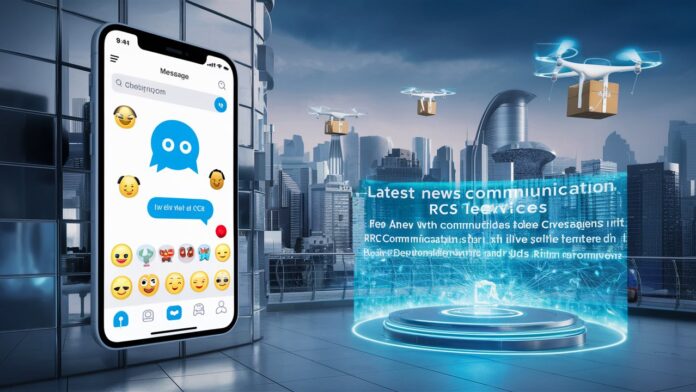Introduction
The messaging landscape is undergoing a seismic shift, driven by the rise of Rich Communication Services (RCS). As traditional SMS becomes increasingly outdated, RCS emerges as a next-generation protocol promising richer, more interactive communication experiences. With tech giants like Google, mobile carriers, and device manufacturers rallying behind its adoption, RCS is poised to redefine how individuals and businesses connect. This article dives deep into the latest RCS news, exploring its features, adoption challenges, security implications, and future potential. Whether you’re a tech enthusiast or a business leader, understanding RCS is critical to navigating the evolving world of digital communication.
1. What Are Rich Communication Services (RCS)?
Rich Communication Services (RCS) is a modern messaging protocol designed to replace SMS and MMS with advanced features akin to popular over-the-top (OTT) apps like WhatsApp or iMessage. Developed by the GSM Association (GSMA), RCS enables users to send high-resolution images, videos, audio clips, and files while supporting features like read receipts, typing indicators, and group chats. Unlike traditional SMS, RCS operates over mobile data or Wi-Fi, allowing seamless integration with other internet-based services. Its adoption has accelerated globally as telecom providers and tech companies collaborate to standardize the protocol, ensuring interoperability across networks and devices.
2. Key Features of RCS: Bridging the Gap Between SMS and OTT Apps
The success of RCS hinges on its feature-rich framework. Users can enjoy enhanced media sharing, dynamic group messaging, and real-time interactions. For businesses, RCS opens doors to interactive customer engagement through branded messaging, chatbots, and clickable buttons. Another standout feature is RCS Business Messaging (RBM), which allows companies to send verified, transactional messages (e.g., flight updates, appointment reminders) with rich media elements. Additionally, RCS supports end-to-end encryption in some implementations, addressing privacy concerns. These features position RCS as a hybrid solution—combining the universality of SMS with the sophistication of app-based messaging.
3. RCS Adoption and Industry Support: Who’s Driving the Change?
The momentum behind RCS is fueled by significant industry partnerships. Google has been a vocal advocate, integrating RCS into its Messages app on Android and pushing carriers to adopt the standard. Major telecom players like Verizon, AT&T, and Vodafone have rolled out RCS support, while device manufacturers like Samsung preinstall RCS-enabled apps. However, challenges persist, particularly with Apple’s reluctance to adopt RCS for iPhones, creating a fragmented ecosystem. Despite this, GSMA reports over 1.2 billion monthly RCS users globally, signaling growing acceptance. Recent RCS news highlights partnerships with retailers and financial institutions leveraging RBM for personalized marketing and customer service.
4. RCS vs. OTT Messaging Apps: Can It Compete?
While OTT apps dominate in regions with high smartphone penetration, RCS offers unique advantages. Unlike WhatsApp or Telegram, RCS doesn’t require users to download a separate app—it works natively on compatible devices. This universality makes it accessible to billions who rely on SMS. Moreover, RCS bridges the gap between consumers and businesses by enabling verified, interactive messaging without sharing personal phone numbers. However, OTT apps still lead in encryption and cross-platform consistency. The true test for RCS lies in overcoming interoperability hurdles and convincing users to switch from entrenched platforms.
5. Security and Privacy in RCS: Are Messages Safe?
Security remains a critical concern in RCS news. While early implementations lacked encryption, Google’s integration of end-to-end encryption (E2EE) in its Messages app marks progress. However, E2EE isn’t universally applied—it depends on carriers and device compatibility. Critics argue that without mandatory encryption, RCS could be vulnerable to interception. Privacy advocates also highlight risks tied to business messaging, such as data harvesting. GSMA and stakeholders are working on standardized security frameworks, but until then, users must stay informed about their provider’s privacy policies.

6. RCS and Business Communication: Transforming Customer Engagement
For businesses, RCS is a game-changer. RCS Business Messaging allows brands to send immersive, interactive content directly to customers. Imagine receiving a boarding pass with a live flight tracker, a restaurant reservation link, or a product catalog with embedded purchase buttons—all within a text thread. Retailers like Walmart and airlines like KLM have already piloted RCS for promotions and updates. Analysts predict RBM will dominate business-to-consumer (B2C) communication, offering higher open rates than email and greater authenticity than social media ads.
7. The Future of RCS: What’s Next?
The future of RCS hinges on broader adoption and innovation. Upcoming developments include deeper AI integration (e.g., smart replies, automated customer service), 5G compatibility for faster media sharing, and expanded use cases in IoT and banking. However, Apple’s participation remains a wildcard—if iPhones embrace RCS, the protocol could achieve true universality. Meanwhile, regulatory scrutiny over data practices and antitrust concerns (e.g., Google’s dominance in Android RCS) may shape its trajectory. One thing is clear: RCS is here to stay, and its evolution will redefine global communication.
Conclusion
Rich Communication Services (RCS) represents more than just an upgrade to SMS—it’s a transformative force in digital communication. With its blend of rich features, business potential, and cross-carrier compatibility, RCS is poised to bridge the gap between legacy systems and modern messaging apps. While challenges like fragmentation and security persist, the relentless push from industry leaders ensures RCS will remain a focal point in tech news for years to come. As consumers and businesses alike embrace this new standard, the way we connect—whether for personal chats or customer service—will never be the same.
Frequently Asked Questions (FAQs)
Q1: How is RCS different from SMS?
A1: Unlike SMS, RCS supports multimedia content, read receipts, typing indicators, and group chats. It operates over data networks, enabling richer interactions similar to apps like WhatsApp.
Q2: Do I need a specific app to use RCS?
A2: On Android, RCS is built into the default Messages app. iPhone users currently rely on SMS unless Apple adopts RCS.
Q3: Is RCS secure?
A3: Security varies by provider. Google Messages offers end-to-end encryption, but not all carriers or devices support it yet.
Q4: Can businesses benefit from RCS?
A4: Absolutely. RCS Business Messaging allows brands to send interactive, verified messages, improving customer engagement and conversion rates.
Q5: Will RCS replace SMS?
A5: Likely, as carriers phase out SMS. However, full global adoption depends on resolving interoperability and device compatibility issues.
This comprehensive guide equips you with the latest RCS news and insights, ensuring you stay ahead in the ever-evolving world of messaging technology.

